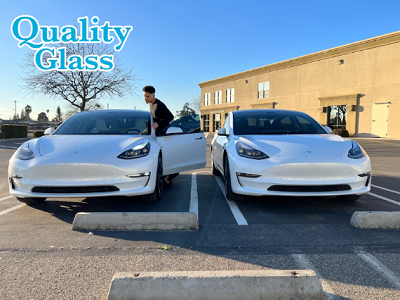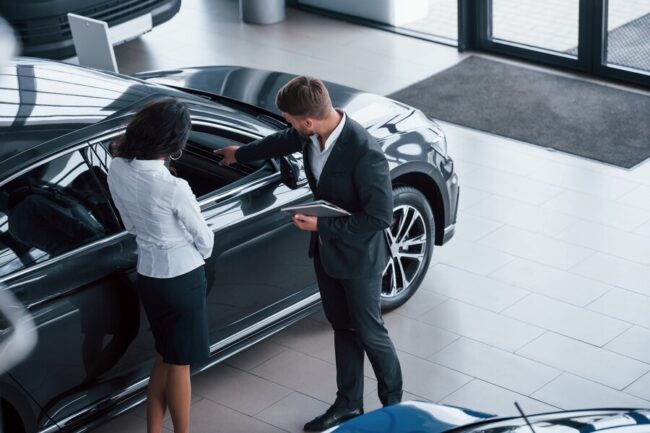In the fast-paced world of automobiles, one often overlooks the importance of a vehicle’s glass components. Auto glass, though seemingly unassuming, plays a crucial role in ensuring driver and passenger safety while adding structural integrity to the vehicle. As a vital component that contributes to the overall safety and functionality of a car, understanding the nuances of auto glass replacement becomes imperative for every vehicle owner.
Auto Glass Replacement: What You Should Know delves into the intricacies of this often underrated aspect of automotive maintenance. From the various types of auto glass to the factors influencing replacement decisions, this blog aims to be a comprehensive guide for individuals navigating through the world of auto glass repairs.
With technological advancements and evolving safety standards, staying informed about the latest trends in auto glass replacement is essential for making informed decisions that go beyond just aesthetics. Join us as we explore the critical aspects of auto glass replacement, empowering you to make informed choices that prioritize both safety and functionality.
Understanding Auto Glass Types
Exploring the diverse landscape of auto glass is paramount for vehicle owners seeking a comprehensive understanding of their vehicle’s components. Windshields, side windows, and rear windows each serve distinct purposes, and recognizing their unique characteristics can influence maintenance decisions.
Delving into the specifics of tempered glass, laminated glass, and other variants provides insight into their resilience against impact and contributes to informed choices when it comes to repairs or replacements. This knowledge empowers car owners to grasp the nuanced functions of different auto glass types, enabling them to make decisions that align with both safety standards and budget considerations.
Safety Considerations In Auto Glass Replacement
Ensuring the safety of both drivers and passengers is paramount in the realm of auto glass replacement. The meticulous process of replacing or repairing auto glass extends beyond mere aesthetic concerns, with a primary focus on maintaining the structural integrity of the vehicle and safeguarding the well-being of those on the road.
 Proper Installation: Precision and expertise in the installation process are crucial to guarantee the effectiveness of the replacement. A poorly installed windshield or window compromises the vehicle’s safety features and structural stability.
Proper Installation: Precision and expertise in the installation process are crucial to guarantee the effectiveness of the replacement. A poorly installed windshield or window compromises the vehicle’s safety features and structural stability.- Quality of Materials: The choice of materials directly influences the resilience of the auto glass. Opting for high-quality, industry-standard glass ensures enhanced durability and protection in the face of potential impacts or accidents.
- Adherence to Safety Standards: Reputable auto glass service providers adhere to stringent safety standards and regulations. Compliance with these guidelines ensures that the replacement process meets industry benchmarks for safety and performance.
- Advanced Safety Features: Modern vehicles often incorporate advanced safety features within the auto glass, such as sensors for automatic wipers, lane departure warnings, or heads-up displays. Proper replacement is essential to maintain the functionality of these features.
- Curing and Drying Process: Allowing sufficient time for the adhesive to cure is critical. Rushing this process can compromise the effectiveness of the replacement, leading to potential safety hazards.
Prioritizing safety considerations in auto glass replacement is a non-negotiable aspect of responsible vehicle maintenance. By understanding the intricacies of proper installation, selecting quality materials, adhering to safety standards, and respecting the curing process, vehicle owners contribute to a safer driving experience for themselves and others on the road. A commitment to safety underscores the importance of choosing reputable service providers and embracing a proactive approach to auto glass maintenance.
Factors Influencing Replacement Needs
A critical aspect of responsible vehicle ownership is recognizing the factors that necessitate auto glass replacement. Beyond aesthetic concerns, cracks, chips, and other damages can compromise the structural integrity of auto glass, posing a significant safety risk.
Weather conditions, such as extreme temperatures or sudden changes, can exacerbate existing damages. Understanding these influences prompts proactive decision-making, preventing potential hazards on the road. Regular inspections and prompt attention to minor damages become imperative, ensuring that replacement needs are addressed promptly and comprehensively, safeguarding both the vehicle occupants and the overall functionality of the automobile.
Technological Innovations In Auto Glass
In the ever-evolving landscape of automotive technology, the realm of auto glass is no exception. Technological innovations in auto glass are reshaping the driving experience, offering advancements that go beyond mere transparency. These innovations are revolutionizing safety, functionality, and even the aesthetics of vehicles, providing a glimpse into the future of automotive design and engineering.
- Smart Glass Technology :Smart glass, equipped with electronic tinting capabilities, is transforming the driving experience. This technology enables the adjustment of tint levels, reducing glare and enhancing privacy at the touch of a button. As a result, drivers enjoy improved visibility and increased comfort during various driving conditions.
- Heads-Up Display (HUD):Heads-Up Display on auto glass projects vital information, such as speed, navigation directions, and alerts, directly into the driver’s line of sight. This not only enhances convenience but also minimizes distractions by keeping essential data within the driver’s field of vision.
- Advanced Materials for Enhanced Safety: Innovations in glass manufacturing involve the use of advanced materials, enhancing the overall safety of auto glass. Laminated glass, for instance, provides increased resilience and impact resistance, reducing the risk of shattering during accidents.
- Integration with Connectivity Systems: Auto glass is becoming an integral part of vehicle connectivity systems. Integration with smartphones and other devices allows for seamless communication, hands-free operation, and enhanced accessibility to various in-car features, contributing to a more connected driving experience.
As technological strides continue to shape the automotive industry, the innovations in auto glass underscore the industry’s commitment to safety, comfort, and cutting-edge design. The integration of smart features, enhanced materials, and connectivity options not only improves the driving experience but also sets the stage for a future where auto glass plays a more dynamic and integrated role in the overall functionality of vehicles. Embracing these innovations ensures that drivers and passengers alike can enjoy a safer, more connected, and aesthetically pleasing journey on the road.
The Role Of Auto Glass In Vehicle Structural Integrity
Auto glass, often perceived primarily for its transparency, plays a pivotal role in maintaining a vehicle’s structural integrity. Beyond providing visibility for drivers, the glass components contribute to the overall strength and stability of the automobile. In the event of a collision, intact auto glass helps distribute the impact force, reducing the likelihood of severe structural damage.
Recognizing the interconnectedness of auto glass with the vehicle’s framework emphasizes the importance of timely repairs and replacements. This understanding prompts car owners to prioritize the maintenance of their auto glass not just for cosmetic reasons but as a fundamental aspect of ensuring the safety and longevity of their vehicles.
Insurance Coverage And Auto Glass Replacement
Navigating the intricacies of insurance coverage is a critical aspect of responsible vehicle ownership, particularly when it comes to auto glass replacement. Understanding the nuances of insurance policies can significantly impact the financial burden associated with repairs or replacements. In this realm, transparency and comprehension are key as car owners strive to make informed decisions about coverage options and reimbursement processes.
 Comprehensive Coverage: Investigate whether your insurance policy includes comprehensive coverage, as this typically covers damages not related to collisions, such as those incurred by falling objects or vandalism.
Comprehensive Coverage: Investigate whether your insurance policy includes comprehensive coverage, as this typically covers damages not related to collisions, such as those incurred by falling objects or vandalism.- Deductibles: Be aware of your policy’s deductible, the amount you are responsible for before insurance coverage kicks in. Assessing your deductible against the cost of auto glass replacement can guide decision-making.
- Glass-Only Coverage: Some insurance policies offer specific coverage for auto glass repairs or replacements, often with lower or no deductibles. Evaluate the terms and conditions of such coverage to determine its adequacy for your needs.
- In-Network Service Providers: Insurance companies often have a network of preferred auto glass service providers. Choosing an in-network provider can streamline the claims process and potentially offer cost benefits.
In the realm of auto glass replacement, the relationship between insurance coverage and financial responsibility is pivotal. A comprehensive understanding of your policy, including its coverage limits and deductibles, empowers you to make financially prudent decisions. Whether opting for comprehensive coverage, exploring glass-specific policies, or selecting in-network service providers, a well-informed approach ensures that the process of auto glass replacement is not only seamless but also financially manageable. Taking the time to assess and comprehend your insurance coverage is an investment in both the longevity of your vehicle and your peace of mind on the road.
Environmental Impact Of Auto Glass Replacement
As sustainability becomes an increasingly important consideration in every industry, including automotive, assessing the environmental impact of auto glass replacement is crucial. The disposal of damaged glass and the production processes involved can have notable ecological consequences. Exploring eco-friendly alternatives, recycling programs, and advancements in manufacturing practices highlights the industry’s commitment to minimizing its carbon footprint.
Informed consumers can actively contribute to environmentally responsible choices by opting for recycled materials and selecting service providers committed to sustainable practices. This consideration aligns auto glass replacement with broader environmental consciousness, fostering a more responsible approach to vehicle maintenance.
Quality Auto Glass Tint, located at 9110 Fairway Dr, Roseville, CA 95678, is your trusted partner for all auto glass needs. With over two decades of industry excellence, we offer top-notch services, including window tint, paint protection, windshield repair, and replacement.
Our experienced team is dedicated to exceeding your expectations, ensuring both safety and aesthetics. Reach us at (916) 888-8495 or Roseville@qualityautoglasstint.com, Monday to Saturday, 9 am to 5 pm. Elevate your auto glass experience with Quality Auto Glass Tint – where excellence meets service.
Contact us today at (916) 888-8495 or Roseville@qualityautoglasstint.com to schedule an appointment or inquire about our services. Visit us at 9110 Fairway Dr, Roseville, CA 95678, and experience over 20 years of industry expertise.
Let Quality Auto Glass Tint enhance the safety and style of your vehicle with our unparalleled auto glass solutions. We’re here for you Monday to Saturday, from 9 am to 5 pm. Choose Quality Auto Glass Tint for a seamless and exceptional auto glass experience.




